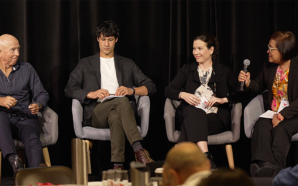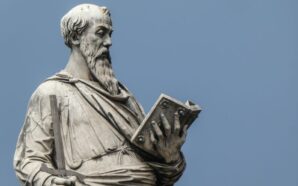Third Sunday of Lent
Readings: Exodus 20:1–17; Psalm 18:8–11; 1 Corinthians 1:22-25; John 2:13–25
3 March 2024
SPIRITUAL REFLECTION with Katherine Stone MGL
I’ve stopped counting the number of engaged couples who have moaned to me about the all-consuming nature of planning a wedding. Their desire is to commit their lives to one another, not to host a huge event! But for almost the entirety of their engagement, the relationship is subsumed by details that seem far away from the heart of what they are doing: invitations, menus, clothes, decorations…
Jesus is protesting just such a dynamic in today’s Gospel. The Temple was supposed to be the place where God dwelt among his people. A place where people could go to pray: to ask for help, find comfort in sorrow, or simply just to spend time in his presence.
Yet, from the moment they set foot within the Temple precinct, the details seemed to overtake the relationship. They had to change their money for Temple coinage. If they had brought their own animals for sacrifice, they had to be checked to make sure they were “without blemish”. Otherwise, they had to buy animals for sacrifice. Then they probably had to queue to get access to a priest to make sacrifice for them.
As human beings, we seem to be naturally put together to set up systems to make our lives easier. There’s usually a good reason for the system, but after some time, we can find ourselves spending more time and effort on the system than on the good it was put into place to protect.
We see a similar dynamic occur over time with the Ten Commandments of today’s first reading. The ultimate goods that they set out to protect are named by Jesus in the Gospels as love of God and love of neighbour. The Ten Commandments spell out some important ways to make sure that we are doing both. Then, over time, the Jews developed 613 laws which, if observed, guaranteed that you wouldn’t break the Commandments.
Jesus consistently brings us back to the heart. God’s desire in bringing the people of Israel out of Egypt and giving them the Ten Commandments was to enter into personal relationship with them. This was also the point of the Temple—that God would dwell amongst his people, that he would be accessible to them, part of their daily lives.
Jesus’ protest is really the same protest that I often hear from overwhelmed engaged couples planning a wedding: “Surely it doesn’t need to be this complicated! All these details are taking us away from the whole point!”
Each Lent, we are invited to come back to the heart of our relationship with God. As baptised Christians, we are all “temples of the Holy Spirit” (1 Cor 6:19). God literally dwells in us, so that he is immediately accessible to us, part of our daily lives!
But it’s easy to get distracted from this profound truth of who we are, especially in today’s world which offers us so many seemingly necessary details that fill our lives so that our living relationship with God is pushed to the periphery while the money changers and livestock sellers absorb our attention.
How to know what’s what? I’d suggest having a conversation with God about it. Ask him for some wisdom and insight about what things in your life are actively bringing you closer to him, and what are actively distracting you. Perhaps the latter culprit is not any particular thing, but the sheer amount of things that we try to fit into our lives. Maybe the wisdom we need from God is about which things we can drop to create some more space to be present to him.
REFLECTING ON THE READINGS THROUGH ART with Mgr Graham Schmitzer
Moses with the Tables of the Law – Guido Reni (1575–1642)
“Moses with the Tables of the Law” (c. 1624), Oil on Canvas 173cm x 134cm. Galleria Borghese, Rome, Italy. Public Domain.
We’ve all heard the saying, “Keep the law, and the law will keep you.” In the seminary, it was, “Keep the Rule, and the Rule will keep you,” and “Keep getting up every morning, and one day it will be your ordination morning.” But such is very impersonal and leads to people living stunted lives, and it leads to a terrible image of God.
This is not the way God introduced the Decalogue—the Ten Words, literally—what we call the Ten Commandants. Listen again to the first line of today’s first reading: “I am the Lord your God who brought you out of the land of Egypt, out of the land of slavery” (Ex 20:1). The emphasis is not so much on the Law as on the Giver of the Law. Two days before, God had said to Moses: “Tell the Israelites: ‘You have seen for yourselves what I did to the Egyptians and how I carried you away on eagle’s wings and brought you to me’” (Ex 19:3–4). The image is of God as a mother-bird carrying her young home to the safety of a mountain-top nest, safe from the dangers of the desert. It reminds us of the scene (already quoted) of Jesus likening himself to a mother hen gathering her chicks under her wings (Mt 23:37).
Israel had already been three months in the Sinai Desert. And what is the picture we see? Even after witnessing their dramatic rescue at the Red Sea, the people almost immediately start whingeing when they see the obstacles ahead of them. “The whole community of Israelites began complaining … ‘Why did we not die in Egypt, where we used to sit round the flesh pots and could eat to our heart’s content! As it is, you have led us into this desert to starve this entire assembly to death!’” (Ex 16:2–3). God answered by sending the manna and the quails which fed the people until they reached Israel.
Then they began complaining again. “Tormented by thirst, the people complained to Moses. ‘Why did you bring us out of Egypt’, they said, ‘only to make us, our children and our livestock die of thirst?’” (Ex 17:3). God gave them water from a rock.
Israel really showed how selfish and childish she was after God has established the Covenant. Moses was taking too long talking with God. “When the people saw that Moses was a long time before coming down the mountain, they gathered round Aaron and said to him, ‘Get to work, make us a god to go at our head; for that Moses, the man who brought us here from Egypt—we do not know what has become of him’” (Ex 32:1). “They exchanged their glory for the image of a grass-eating bull. They forgot the God who was saving them,” the psalmist would later mock (Ps 106:20–21).
And this was after they had already declared: “Whatever Yahweh has said, we will do” (Ex 19:8). They were replying to God’s invitation, “If you are really prepared to obey me and keep my Covenant, you, out of all peoples, shall be my personal possession…. For me you shall be a kingdom of priests, a holy nation” (Ex 19:5–6). The books of Leviticus and Numbers and Deuteronomy continue a litany of Israel’s sins.
We can only look with amazement at God’s never-ending patience. This is the people with whom he established his Covenant. He took Israel into partnership, almost as an equal. In fact, in time, Israel would see the Covenant as a marriage of God and his people. “So, they defiled themselves by their deeds and broke their marriage bond with the Lord” (Ps 106:39). “Yet he who is full of compassion forgave their sin and spared them. So often he held back his anger when he might have stirred up his rage” (Ps 78:38).
The God we worship, whose glory we house within our very selves, is a God who, since the beginning, entered the lives of his people—but in love. The Commandments were given to a people who had been enslaved in order to free them, not to enslave them again. The Sabbath rest, for example, would no longer dominate their lives as it had done in Egypt. We all need “time out”—both to worship God, and to build up our relationships with each other. We need a day off to remember the centrality of God in our lives. God’s testing of Abraham, which we saw last Sunday, was really to know if he was the first in Abraham’s life. God still wants to know this about us. Obedience to God is not an ethical trade-off—you do this, and I’ll do that.
The Commandments, rather like a bannister down a flight of stairs, are given to us by a loving God to protect us—from ourselves, if necessary. Every mature nation is guided by a constitution. Not only does it set out the obligations of its citizens, it sets out their rights, too. It gives its citizens a certain dignity. This is how Israel saw the Covenant. Israel dates its nationhood from that moment on Sinai.
It was common in those times to sign solemn Covenants in blood. Moses sprinkled the blood of slaughtered bullocks on the people and on an altar he had built, saying, “This is the blood of the Covenant which Yahweh has made for you” (Ex 24:8). (How ironic the people would later worship a bull as a sign of their breaking the Covenant!)
Anticipating his death the following day, on Holy Thursday night Jesus would take the Eucharistic cup and say: “Drink from this, all of you, for this is my blood, the blood of the Covenant, poured out for many for the forgiveness of sins” (Mt 26: 27–28). God signs the New Covenant, this one to last forever, in his own blood on Calvary. Every time we come together to celebrate Mass, we show we are the people of the Covenant. It is why, since the time of the apostles, the Mass has been seen by the Church as the most perfect fulfilment of carrying out the obligation of the Third Commandment. It was the signing in blood of the Covenant on Sinai that made Israel a nation. It is in the celebration of Christ’s death on Calvary in the Sacrifice of the Mass that makes us the People of God, the Church. No, you cannot be a Christian all on your own any more than one person can make a family.
It is God’s wisdom and love that has given us the Commandments. And so, we accept them in love, knowing that their keeping makes us wise. Loving and just relationships both within the family and in society, and an awareness of clearly defined boundaries within those relationships, are signs of a civilized people. “Respect” is probably the best word to sum up the Commandments. Respect for God and for his Holy Name, respect for his day, respect for ourselves and for others, and for their rights. The opposite is chaos and anarchy, disorder and confusion. The book of Exodus illustrates this well by the story of Israel’s wanderings in the desert. The people could have reached their destination in a year. Instead, every time they forgot the One who had given them their privileged status, they went round in circles, and even backwards! They would not reach home for 40 years. They are a reminder to us of how difficult we find it to believe that God is who he says he is, and that the keeping of the Commandments frees us rather than inhibits us. We will never find true human fulfilment by breaking the Law of God.
Isn’t it true, as I once heard a biblical scholar say, it takes many of us 40 years before we come to our senses. Les Murray (recently deceased), one of Australia’s best-loved poets, pithily sums up this whole meditation: “The true God gives his flesh and blood. Idols demand yours off you” (The Best 100 Poems of Les Murray, p 93).
Even those who would not consider themselves art-lovers are familiar with the modern work, The Scream, by Edvard Munch. Not everyone’s cup of tea. But in Guido Reni’s Moses with the Tables of the Law, you can almost hear Moses’ scream as he comes down the mountain of Sinai with God’s Law in his hands and finds his people worshipping another god. Forgetting the God who had saved them, they made the fatal mistake of narrowly living for the moment. We do the same, of course. Our perspective is too narrow, and we make idols of things that cannot even begin to supply our needs.
Reni was inspired by the work of Caravaggio, the master of light. As light pours down from the upper left-hand corner, it illuminates Moses’ face, which is contorted with despair and disappointment. His hands tightly grip the tablets that he is on the verge of smashing. The black clothes Moses wears seem almost mournful, emphasising the brightness of the vibrant red cloak he dons.
Reni was born in 1575 in Bolognia, then part of the Papal States. He was apprenticed at the age of 10 to the Flemish painter, Denis Calvaert, then he became part of the Carracci family of painters who urged a return to the realism of the great masters of the High Renaissance—Raphael, Titian, and Veronese. In Rome, he executed commissions for Pope Paul V (Borghese). This painting of Moses still remains in the Villa Borghese in Rome. It was painted about the year 1624. In later life, Reni returned to Bolognia where he died on 18 August 1642.
Katherine Stone MGL is a Missionaries of God’s Love (MGL) sister living in Varroville, NSW. Originally hailing from Tasmania, she joined the MGL Sisters in 2005. Since then, she has lived in Canberra, Melbourne and Sydney, studied theology and spiritual direction, and has done a term as formator. These days, her main ministries are spiritual direction, talks and teaching, and retreat giving. She is also the MGL sisters’ vocations director. Her passion is Jesus—as may be apparent from her ministry, she loves talking about him and to him, and hearing others share their own experiences of him.
Monsignor Graham Schmitzer is the retired parish priest of Immaculate Conception Parish in Unanderra, NSW. He was ordained in 1969 and has served in many parishes in the Diocese of Wollongong. He was also chancellor and secretary to Bishop William Murray for 13 years. He grew up in Port Macquarie and was educated by the Sisters of St Joseph of Lochinvar. For two years he worked for the Department of Attorney General and Justice before entering St Columba’s College, Springwood, in 1962. Mgr Graham loves travelling and has visited many of the major art galleries in Europe.
With thanks to the Diocese of Wollongong, who have supplied this reflection from their publication, Pietà – Lenten Program 2024. Reproduced with permission.








